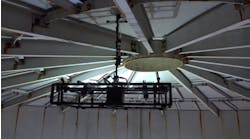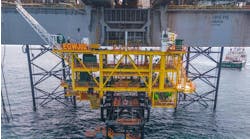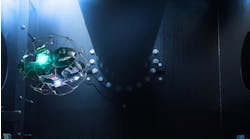Fabricator expects boom in Azeri offshore construction
Construction of the Chirag 1 module support frame at the Zykh-2 yard.As wave after wave of international consortia sign up for production sharing agreements in the Azeri Caspian, the investments made by pioneering engineering firms a few years back in local facilities are beginning to pay off. One western fabricator latching onto the Caspian Sea's potential has branched from its North Sea origins.
Consafe Engineering opened a welding training school in Baku in July 1995 and formed a fabrication facility with a local company - now named Consafe (Azerbaijan). The move followed an 18-month assignment of business development manager Fergus Hardie to Baku, aimed at building relations with SOCAR, AIOC and other emerging Caspian consortia. Consafe set up a base in Baku, and agreed to use a high local labor content. Fabricating on the spot was also a big advantage in a region landlocked for much of the year.
Last year, as Azeri exploration and production activity stepped up, the European fabricator enlarged its position so that it could offer house engineering staff formerly based in Aberdeen, as well as personnel from such operators as BP. The expansion was also based on obtaining a position in Kazakh and Turkmen operations.
Exploration drilling is about to get underway in both Kazakh and Turkmen parts of the Caspian, but there is little local engineering back-up. Consafe (Azerbaijan)'s initial tasks included a contribution to the Israfil Guzeinov pipelay barge refurbishment, under sub-contract to McDermott. Then last August, Consafe's alliance with Altra Consultants was awarded a four-year engineering and fabrication services contract by AIOC for the Chirag 1 platform - including a new water injection module - and also work for the new Sangachal oil terminal.
Altra's responsibility is process engineering, while Consafe builds the packages, although it did contribute to the FEED study for the water injection. More opportunities may emerge soon, with AIOC about to invite bids for two complete platforms and a production barge.
Also last August, BP awarded Consafe a contract to refurbish the accommodation on the Shelf 5 semisubmersible, due to start exploration drilling on the Shah Deniz PSA later this year. This Russian rig is currently being upgraded under a $150 million program, extending its life by eight to ten years. More tenders may be issued soon for a further drilling module. There are at least two more Russian semis awaiting upgrades.
At peak, around 150 Azeris were employed at Consafe (Azerbaijan), with over 450,000 man hours of Azeri labor recorded over the past two years. Welders were trained to European standards. The facilities are good enough to construct Consafe's standard range of modules, and flowline fabrication and general steelwork should also be possible.
"For anything not hugely reliant on great structural strength, such as floor plate, we try to use local steel suppliers," says Consafe's local business development manager, Fergus Hardie. "Cold rolled sections and high strength beams are hard to get hold of. Logistics for any imported material is the biggest problem - shipping parts in via the canals is the cheapest way, but these are only navigable at certain times of the year. Trucking and air freight are very expensive.
"We remain optimistic about the future, with the market so buoyant, although political uncertainties in this region can never be written off."
Baku yards thriving on drilling rig overhauls
Since Aker Rauma first delivered the Kaspmorneft (now the Dada Gorgud) as a new build-drilling rig for the Caspian Sea in 1978, offshore construction work for the company in this region now amounts to around 40% of its overall turnover. Aker Rauma operates two facilities in Azerbaijan, both located in Baku and both run through co-operation agreements with local companies - the Zykh-2 yard, with the state oil company Socar, and the 15,000-sq-meter Zakfederazia shipyard, with the Caspian Shipping Company.An agreement regarding the use of the Zykh-2 yard was signed with Socar last April following successful completion of a project to construct a module support frame for AIOC's Chirag 1 platform which Aker Rauma executed in cooperation with Socar. Work carried out at the yard include upgrades, fabrication of modules, pressure vessels and steel structures up to 1,000 tons, along with associated installation and assembly work, painting and scaffolding, procurement and project management.
At the Zakfederazia shipyard, Aker Rauma carries out repairs, upgrades, and modifications to rigs, ships and special vessels. Last year, the company transported the former Marawah jackup rig (now renamed the Khazoil 1) from Bahrain to Baku. In conjunction with Khazoil Company Limited (a subsidiary of the Russian oil company LUKoil), Aker Rauma is now in the process of modifying the rig in a $26 million contract to upgrade it for greater efficiency and use in deeper waters. On completion, LUKoil intends to operated the jackup on its own oil and gas fields in the Northern Caspian area in addition to offering it to other oil companies drilling in the area.
The Marawah was the first drilling rig to be dismantled and transported in sections to the Caspian Sea. The knock down operation was carried out at Aker Rauma's facilities in Pori, Finland and transportation followed the Volga-Balt river-canal route. According to deputy managing director, Bekka Venho, the reassembly worked out well. "Apart from some minor delay in the contract, the operation went very smoothly and we are on schedule to complete the upgrading program by July this year" says Venho.
Aker Rauma is also working on the Shelf 5 semisubmersible in a $30 million project to refurbish the accommodation area and to install new drilling equipment, including a derrick substructure. To make way for the new drilling packages, over 3,500 tons of equipment has been removed and sponsons are being added to the hull to increase its payload capacity. On completion the rig will be capable of operating in high pressure environments up to reservoir depths of 6,500 meters. The project is due to be completed this August in time to carry out the first of two exploration wells on the Shah Deniz Field, owned by a seven-company partnership operated by BP.
Meanwhile, the semisubmersible Dada Gorgud which Aker Rauma first delivered to the Caspian as the Kaspmorneft in 1978, arrived back at the Zakfederazia shipyard in February this year. The drilling rig is undergoing structural changes and being upgraded with new equipment such as a top drive. Completion is expected in a few months.
Future plans for Aker Rauma in Baku include expanding its facilities there. In this respect, negotiations are currently ongoing with local companies. The company also sees opportunities for maintenance contracts, particularly for existing structures, and the possibility of building its own design rigs, although plans to carry out this type of work are at a very early stage.
Cooperation agreements with local companies also include the use of the indigenous labor force and Aker Rauma carries out training programs so that workers meet western qualification standards in areas such as welding. Despite experiencing some problems caused by language barriers, the company conducts local training on computer systems.
Copyright 1998 Oil & Gas Journal. All Rights Reserved.



